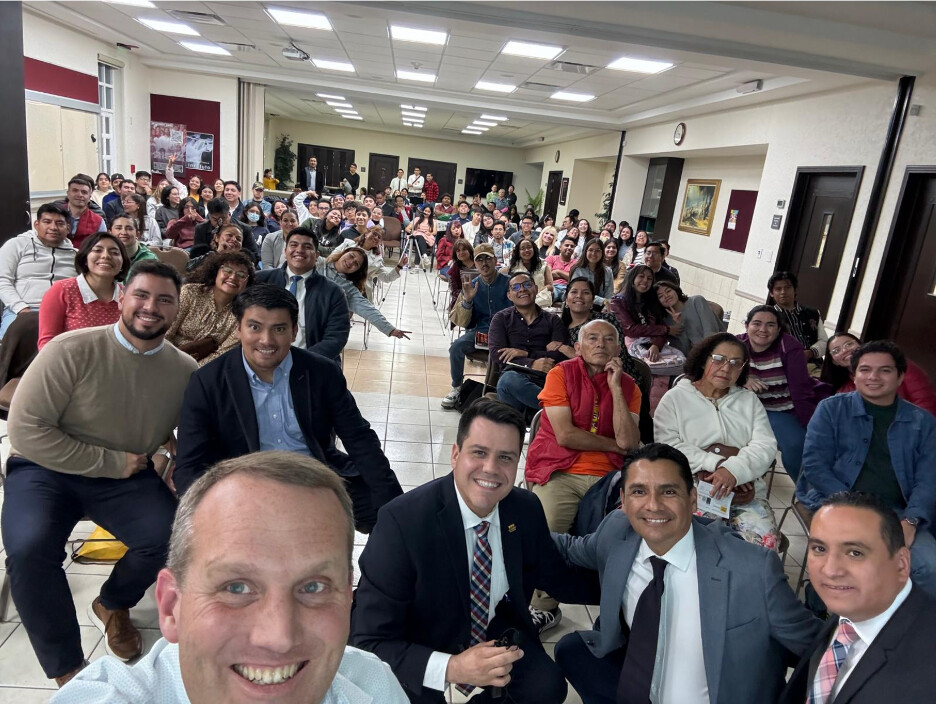
Streets are loud with sellers, barking prices and negotiating trades, each vendor trying to earn enough to feed their families for the month. Whether selling fruit, baskets, or spices, Brian Christensen couldn't imagine the thoughts of the sellers and how they live with little to nothing.
Watching the kids run around and the parents fighting to earn a peso or two during market hours, Christensen believed he could learn a thing or two from the business.
Christensen took a sabbatical from BYU-Idaho in 2019 and traveled to Mexico and Colombia to work with micro-entrepreneurs. He spent months learning, interviewing business owners, and learning firsthand what it takes to be a successful business in challenging circumstances through Mentors International, a non-profit that seeks to pull individuals out of poverty by mentoring businesses.
"What I learned changed me," Christensen documents. "It wasn't resource-based—it was
mindset, resilience, and entrepreneurship. These guys don't say no."Brian Christensen at a local business conference held at a University in Mexico.
From Corporate Boardrooms to the Classroom
Christensen's Latin American experiences were the reward for a lifetime of learning and
business.
Christensen majored in economics at Brigham Young University, the discipline in which he launched a career as a management consultant at Boston Consulting Group (BCG) early on.
There, he performed strategic work with Fortune 500 clients before moving to Dallas, where he utilized his Spanish language skills to conduct business with Latin American firms.
Scaling up even more, Christensen went on to earn an MBA at Stanford University, then shifted into consumer goods, where he worked with Kimberly-Clark on e-commerce solutions for brands like Huggies and Kleenex.
"I liked business, but I wanted to do something more personally rewarding," he says. "That's when I seriously started thinking about teaching."
Finding Purpose Through Teaching and Service
In 2019, Christensen accepted employment at BYU-Idaho, entering the academy with the dream of mentoring young business students. While teaching was a radical change from his fast-paced corporate world, he loved assisting students with business concepts and real-world applications.
Following the sabbatical was the opportunity to get out of the classroom and immerse himself in an ongoing interest in global business development. Under the auspices of Mentors International, Christensen journeyed into small villages and towns and met more than 30 entrepreneurs, learning the key to their success. He helped lead focus groups, provided hands-on mentoring, and gathered information to learn more about financial, operational, and marketing techniques that were successful in low-resource environments.
Lessons from Latin America
Perhaps the most vivid lesson of all was the determination of the entrepreneurs he met. Few of them had much formal education, but they succeeded in business by sheer willpower and flexibility."It was fascinating to watch how resourcefulness prevailed over resources," Christensen says.
"Some of these entrepreneurs began with hardly anything but built their businesses through strategic planning and dogged effort."
These experiences have had a profound effect on Christensen's pedagogy. He now incorporates lessons from Latin America into his BYU-Idaho courses, showing students that business concepts work anywhere, whether in Rexburg or Bogotá.
"There's a lot of similarity between my students and the entrepreneurs I met abroad," he says. "In both cases, success boils down to finding key factors that drive growth and using them effectively."
Paying It Forward
Along with teaching, Christensen is trying to bridge the divide between practice and research. He continues to serve with Mentors International and other groups, sharing his research to help refine business training programs for poor entrepreneurs.
"Coming together as a team can be potent," he says. "If we can align resources with successful approaches, we can help more people lift themselves out of poverty."
Now back at BYU-Idaho, Christensen is still passionate about applying business to do good.
“Business isn’t just about profit,” he says. “It’s about lifting people and transforming lives.”
Whether he is mentoring students or working with entrepreneurs in distant nations, he is
committed to proving that business isn't only about profit—it's about transforming lives.